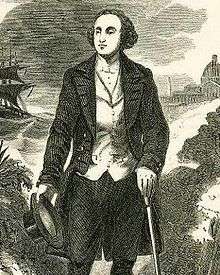George Cabot
| George Cabot | |
|---|---|
 | |
| United States Senator from Massachusetts | |
|
In office March 4, 1791 – June 9, 1796 | |
| Preceded by | Tristram Dalton |
| Succeeded by | Benjamin Goodhue |
| Personal details | |
| Born |
December 3, 1752 Salem, Massachusetts |
| Died |
April 18, 1823 (aged 70) Boston, Massachusetts |
| Political party | Federalist |
| Children |
Charles Cabot Henry Cabot Edward Cabot Elizabeth Cabot |
| Parents |
Joseph Cabot Elizabeth Higginson |
| Alma mater | Harvard University |
| Occupation | Merchant |
George Cabot (December 3, 1752 – April 18, 1823)[1] was an American merchant, seaman, and politician from Boston. He represented Massachusetts in the U.S. Senate and as the Presiding Officer of the Hartford Convention.
In 1789, President George Washington breakfasted at Cabot's Beverly, Massachusetts home when he was in town inspecting the country's first cotton mill and the newly constructed Essex Bridge that connected Beverly with Salem.[2]
Early life
Cabot was born in Salem, Massachusetts.[1] His father was Joseph Cabot, a ship merchant. His mother was Elizabeth Higginson.[3] He had ten siblings,[3] including John Cabot (b. 1745), Joseph Cabot Jr. (b. 1746), and Samuel Cabot (b. 1758).
Cabot attended Harvard College for two years before dropping out to go to sea. By the age of twenty-one, he was captain of his own ship.
Political career
Cabot's political career began in 1775, when he became a member of the Massachusetts Provincial Congress. In 1777, he was a delegate to the state constitutional convention. In 1787, Cabot was a delegate to the state convention that ratified the United States Constitution. He was elected a fellow of the American Academy of Arts and Sciences in 1788.[4] He was elected to the United States Senate and served from March 4, 1791 to June 9, 1796. He was a supporter of the financial policies of Alexander Hamilton, and became a Federalist when that party was organized. In 1793, he was named a director of the First Bank of the United States. In 1798, Cabot was appointed but declined to be the first United States Secretary of the Navy.
Cabot was politically opposed to the isolationist policies of the Jefferson and Madison administrations, in particular opposing the Embargo Act of 1807, which had a negative on trade conducted by New England merchants. Cabot was elected as a delegate to the Hartford Convention, organized in 1814 by Federalist politicians of New England unhappy with the conduct of the War of 1812. Cabot chaired the secretive meeting, which called for constitutional reforms but stopped short of calling for secession, and was widely viewed as bordering on treason. The Treaty of Ghent, signed while the convention was meeting, ended the war, and also effectively ended the Federalist Party and Cabot's political career.
Personal life
He had four children: Charles, Henry, Edward, and Elizabeth.[3] Through Henry, Cabot was a great-grandfather of Henry Cabot Lodge[3] and the progenitor of a number of other prominent members of the Cabot family.
Cabot died in Boston, Massachusetts in 1823, and was initially buried the Granary Burying Ground. He was later reinterred in Mount Auburn Cemetery in Cambridge, Massachusetts.
References
- 1 2 "CABOT, George, (1752 - 1823)". Biographical Directory of the United States Congress. Retrieved July 28, 2011.
- ↑ http://www.beverlyhistory.org/education/bevhistory.html
- 1 2 3 4 Lodge, Henry Cabot (1878). Life and Letters of George Cabot. Little, Brown and Company. Retrieved January 11, 2012. pp. 8, 323, 568
- ↑ "Book of Members, 1780–2010: Chapter C" (PDF). American Academy of Arts and Sciences. Retrieved July 28, 2014.
External links
- United States Congress. "George Cabot (id: C000009)". Biographical Directory of the United States Congress.
- Encyclopaedia Britannica George Cabot
| United States Senate | ||
|---|---|---|
| Preceded by Tristram Dalton |
U.S. Senator (Class 1) from Massachusetts 1791–1796 Served alongside: Caleb Strong |
Succeeded by Benjamin Goodhue |
